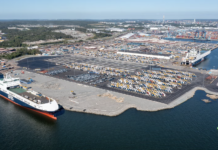
The Federal Maritime Commission (FMC) says it has received a number of allegations regarding the failure of container ship operators to pick up full cargo containers ready for export to China.
According to the FMC commissioner Carl Bentzel the regulator “is monitoring the situation,” with lines required to meet common carrier obligations. Under US law a common carrier must provide its services to anyone willing to pay its fees unless there are good grounds for refusal.
Under these legal obligations the rights of US shippers to export their cargo are enshrined in law, yet a number of allegations have surfaced where shippers believe that the carriers have ignored their responsibilities as common carriers in order to return empty boxes to Asia, taking advantage of the unprecedentedly high rates on the Pacific.
Consultant Jon Monroe, who also works for Worldwide Logistics, said last week, “Exports are hurting with carriers like Hapag Lloyd suspending export agricultural bookings as they move to reposition as many empties as possible back to Asia. As we enter the second week of November, we find that bookings are backed up until the first week of December.”
According to the FMC the carriers may be looking to maximise their income by returning boxes as rapidly as possible to Asia where a 40’ container can pick up cargo for around US$4,000, and ignoring the less lucrative cargo to Asia, which fetches around US$700/FEU, but the lines may find that it takes time to return the box from its Asian delivery.
Monroe believes that the container imbalance in the Pacific trades has been caused by the shipping lines’ management of capacity, with THE Alliance having already announced its cancelled sailing for December.
Disruption to the supply chain has occurred as a result of the imbalance of containers, with cargo reportedly rolled over in Asia and congestion in the US and European ports.
“BCOs are scrambling for space wherever they can get it. Unfortunately, issues seem to be a little clouded from the view at the top. Company CEOs are just now learning of the issues disrupting their supply chain. Many do not believe what they are being told. I have been asked to and have had discussions with a number of members of senior management have woken up to the fact that their product is running late to their customers and their transportation budget has more than doubled,” said Monroe.
However, Bentzel also noted that while the major US ports, including Los Angeles and Long Beach, may have an excess of containers, “There is too much cargo in record months,” he said, adding, “There are not enough chassis,” to transport containers from the terminal yards, causing a backlog at the ports.
In October, both the Port of Long Beach and the Port of Los Angeles, the busiest ports in the US, reported record monthly volumes. Long Beach handling 795,580TEU in September, up 12.5% on the previous year, while Los Angeles recorded throughput of 883,625TEU, up 13.3% on September 2019.
Nick Savvides
Managing Editor








